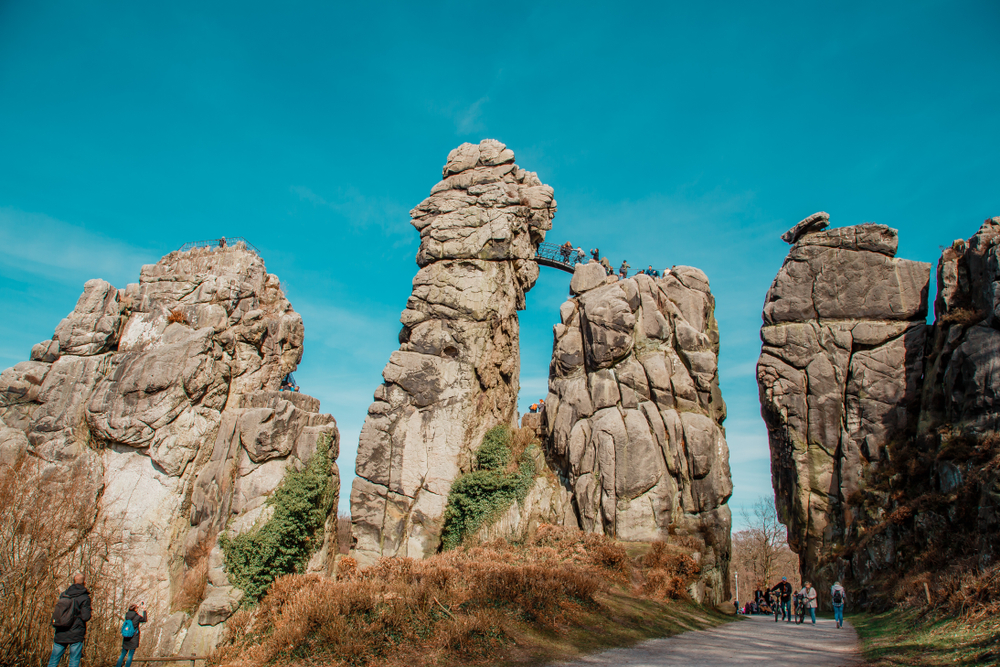Religion: Folk and Traditional Religions
Paganism
(Germanic Paganism)
Introduction: Paganism is an ancient religion that dates back to pre-Christian times and may be called Germanic paganism. It was practiced in Germany until the Christianization of the country in the fifth and sixth centuries.
Origin: Paganism is based on the pre-Christian religious beliefs and practices of Germanic peoples. It has its roots in the Iron Age and has been practiced in some form or another for over a thousand years. Paganism is a polytheistic religion, and in Germany its deities include Odin, Thor, Freyja, and many others.
History: Paganism flourished in pre-Christian times and was the dominant practice, with temples and shrines dedicated to various gods and goddesses. Germans were converted to Christianity during different periods, beginning in the fourth century. However, pagan beliefs and practices were not completely eradicated and survived in both folklore and in isolated areas.
Adherents: There are no official statistics on the number of adherents to paganism.
Belief System: Germanic paganism is a polytheistic religion that believes in the existence of multiple deities. These are viewed as powerful, supernatural beings that have control over various aspects of the natural world. Paganism in Germany also places great emphasis on the concept of wyrd, which is considered as fate or destiny, an all-connecting force that determines the course of events in the universe. Paganism also places a strong emphasis on the natural world.
Practices: Pagans practice a variety of rituals and ceremonies, including offerings to the gods and celebrating the changing of the seasons and the cycles of the moon and sun. Germanic paganism also places great importance on the use of runes, letters in an ancient Germanic alphabet used in modern times for divination and magic.
Rituals, Events, Celebrations
- Festivals and holy days: These occur throughout the year, many of which are tied to the cycles of the seasons and the agricultural calendar.
- Erntedankfest: This is a harvest festival celebrating the end of the growing season and the bounty of the earth, held on the first Sunday in October.
- Walpurgis: Recognized on the night of April 30 until May 1, in ancient times this evening was associated with witches and the supernatural and included the lighting of bonfires. Today, Walpurgis is celebrated for fun.
- Yule: This was a pagan winter solstice celebration, which today includes feasting, gift giving, and the lighting of candles or fires.
Sacred Texts: Pagans do not have a specific sacred text, but draw upon a variety of sources, including ancient myths and legends, poetry, and folk tales.
Places of Worship: A "heathen hof" is a Germanic pagan temple for holding worship rites. Pagans also may gather in natural settings, such as forest groves or near rivers and mountains.
Sacred Places: There are a number of sacred places in Germany that are associated with paganism. Forest groves were thought to be the home of gods, with oak trees considered sacred. In Upper Franconia in Bavaria (southern Germany) is Walberla, one of the two peaks of Ehrenbürg mountain. It was considered a spiritual site for ancient pagan worship that was thought of as the home of the gods. Externsteine is the site of pillar-shaped rock formations and was also an ancient pagan worship site.
Leadership Structure: Paganism does not have a formal leadership structure, but may be led by elders or spiritual guides.
Role in Society: Paganism links Germans to their ancient heritage and culture as well as the natural world and those who have come before them.
Copyright © 1993—2025 World Trade Press. All rights reserved.

 Germany
Germany 
